Huawei will provide 5G base stations to operate in different spectrum bands
Chinese vendor Huawei Technologies has secured over half of a major contract to deploy 5G mobile base stations for local carrier China Mobile, Chinese news site Yicai Global reported.
According to the report, the vendor obtained over 50% of the total of China Mobile’s centralized procurement program in 2023.
The report also stated that Huawei will provide 5G base stations for different frequency bands. The bands ranging from 2.6 GHz to 4.9 GHz will have around 63,800 stations, divided into two projects, while the number of base stations to operate in the 700 MHz band will be 23,100, divided into three projects.
ZTE was the second-biggest winner in terms of base stations, followed by Datang Mobile Communications Equipment, Ericsson and Nokia Shanghai Bell.
This year, China Mobile expects its capex to reach CNY183.2 billion ($25.6 billion), slightly down compared to investments in the last two years. The carrier will invest CNY83 billion on 5G networks, which is more than 10% less than in 2022.
China Mobile plans to operate more than 1.6 million 5G base stations this year, with 360,000 new additions. The telco aims to increase its number of cloud servers by more than 240,000 units and add 40,000 external data center racks, according to the report.
The carrier said it ended last month with 699 million 5G package subscribers, after a net addition of 9.6 million 5G subscribers during the month. China Mobile added a total of 227.2 million subscribers in the 5G segment during 2022.
China Mobile’s overall mobile subscriber base at the end of April amounted to 983 million, almost flat compared to the previous month. Last year, China Mobile added a total of 18.11 million subscribers.
China Mobile recently highlighted its growing presence in the 5G private market, saying that by the end of December 2022, it has signed more than 18,000 agreements for 5G commercial projects across multiple sectors. “We achieved industry leadership in segments including smart mining, smart factories, smart grid, smart hospitals, smart city and autonomous driving,” the telco said in its latest earnings statement.

